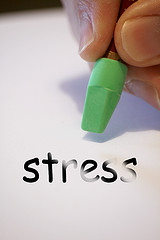 The Guardian.com’s Global Development Professionals Network recently ran a Q&A series on New Year’s resolutions. They asked me to participate by sharing my response to a question posed by a human rights worker. The original post can be found here.
The Guardian.com’s Global Development Professionals Network recently ran a Q&A series on New Year’s resolutions. They asked me to participate by sharing my response to a question posed by a human rights worker. The original post can be found here.
Q: Last year I was overworked and stressed out by my job. My work can also be quite traumatic, meeting and interviewing people who have suffered human rights abuses. How can I continue to give my all to my job that I care passionately about, while not neglecting my physical and emotional health?
A: Your goal of giving your best at work, while not neglecting your physical and emotional health, is one that we would all do well to adopt. Of course, the two elements of this goal are two sides of the same coin: you cannot give your best at work if you do not practice self-care. It’s simple, but not easy. There are three elements that will contribute to your success: self-awareness, boundaries and accountability.
Self-awareness
First, you must know yourself – what energises you? What depletes you? What do you need to feel physically well – how much sleep, what kind of food, how much exercise? What do you need to feel emotionally whole – how much time with friends, how much solitude, what kind of spiritual practices? How do you best process your emotionally intense work experiences – with a therapist, by writing in your journal, by sharing with colleagues? How much distance from your work do you need, whether through non-work friends and outside activities, relaxing trips or alternate work assignments?
As you look ahead to the new year, take some time to reflect on what contributed to your physical and emotional health in the past year, and what hindered it. What enabled you to give your best to your job, and what kept you from being at your best?
Boundaries
Self-care requires setting some boundaries. When you work in global development, your job will take as much from you as you are willing to give it. It’s up to you to decide how much is enough. How many hours a week will you work? How much time will you spend in the field? How much travel will you do? Of course, there will be emergencies during which you may choose to temporarily set aside your boundaries and work harder, longer, under stressful circumstances, because the situation warrants it. Just check yourself to ensure you are not operating in emergency mode all the time.
Accountability
To make your self-care practices stick, tap into the power of accountability. You are probably very diligent and dependable at work. If you tell your boss that you will write a report by the end of the week, you deliver. If you set a time to interview someone who has suffered human rights abuses, you show up. These external accountabilities are easier to meet because they tap into the power of social expectations. Someone else is counting on you. And yet, when you resolve to leave work at a decent hour, start exercising, or get more sleep, you may be less likely to accomplish these. This is true for most people. It’s easy to hit the snooze button on our personal goals when no one else knows about them.
The trick is to externalise our internal goals. Don’t just keep your goals in your head. Research shows that people who write down their goals, share this information with a friend, and send weekly updates to that friend are on average 33% more successful in accomplishing their stated goals than those who merely thought about their goals.
Self-care may seem selfish. But in the long run, it benefits your organisation, your team, and the survivors of human rights abuses that you interview, because taking care of yourself will enable you to give your work your best. Self-care can help keep you from burning out, becoming ineffective, and/or ultimately quitting when your best work is still needed. To have a global development career that makes an impact, view it as a marathon rather than a sprint.
Photo by Alan Cleaver

